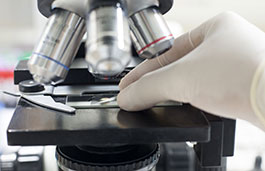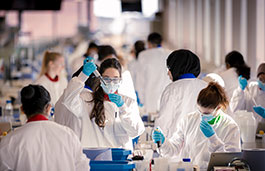Search
Antimicrobial Resistance MSc
Study level: Postgraduate
Develop advanced laboratory, research, and analytical skills to help combat antimicrobial resistance. Explore infection prevention, antimicrobial stewardship and data analytics, preparing you for careers in microbiology, public health and policy.
Course features
Year of entry
Location
Coventry University (Coventry)
Study mode
Full-time
With Professional Placement
Duration
1 year full-time
Up to 2 years full-time with professional placement
Course code
EEST016
Start date
January 2026
March 2026
May 2026
July 2026
Course overview
This course is aimed at graduates wishing to continue their studies in Microbiology and AMR or those with experience in industry and healthcare. The course aims to produce the confident practitioners, researchers and change-makers needed to lead the fight against AMR.
Key course content includes:
- core modules and skills development: explore antimicrobial stewardship, infection prevention and big data analytics, alongside hands-on experience in advanced laboratory techniques.4
- global and interdisciplinary focus: gain insight into the academic, global, and regulatory contexts to infection prevention and control, microbial contamination and antimicrobial stewardship.
- career preparation: receive training and practice in research, analysis, evaluation and presentation - skills valued by employers within microbiology, public health and antimicrobial resistance fields.
5 QS Stars for Teaching and Facilities
QS Stars University RatingsRanked 9th Modern University in UK by the Times
The Times and Sunday Times Good University Guide 2025Ranked 4th for Overall Satisfaction in PTES
Postgraduate Taught Experience Survey (PTES) 2025Why you should study this course
Hands-on laboratory experience: supported by a dedicated group of microbiologists, gain practical skills in microbiology and molecular biology through embedded lab sessions in Coventry's industry-standard facilities, including the Super-Lab and analytical chemistry suites.4
Digital literacy certification: The course integrates two International Certificate of Digital Literacy (ICDL) modules, Data Analytics and Big Data. You will be awarded an ICDL certificate and electronic badge on successful completion of the course.
Global perspective on AMR: benefit from a curriculum that integrates international best practices and perspectives, providing an understanding of AMR and its global impact.
Tailored career progression: prepare for various roles in microbiology and AMR with embedded support for postgraduate study and professional advancement.
Capstone research project: this course will culminate in a research project where you will apply and evidence you're learning to design, implement, analyse and report on a project based around AMR.
Gain practical experience: boost your CV with an additional professional placement. See the modules for more details.2
Our Award-winning Green Superlab
With space for over 250 students and packed full of industry-standard equipment, the Coventry University Superlab is an amazing place to learn, experiment and discover. Find out what we’re doing in our Superlab to make it greener and reduce our waste and carbon emissions.
Antimicrobial resistance is a global health threat causing economic and social burdens in our communities. In this context, there is a global need for professional figures to tackle this issue.
Our new postgraduate courses in antimicrobial resistance aim to support potential students from different backgrounds, such as UK-domiciled and international graduates and mid-career health professionals who wish to extend and deepen their expertise in the antimicrobial resistance and infection control spheres.
I look forward to seeing you all on our campus and joining our fantastic community and course.
Dr Gaetano Del Gaudio - Course Director quoted in 2022

What you'll study
Develop an understanding of key global pathogens, antimicrobials, antimicrobial resistance, infection prevention, control policies and procedures, antimicrobial stewardship, and apply knowledge to problem-based scenarios in a global context. Learn a wide range of conventional and molecular microbiology laboratory techniques that are relevant across the bioscience sector.
We regularly review our course content, to make it relevant and current for the benefit of our students. For these reasons, course modules may be updated.
How you'll learn
Teaching and learning methods may include:
- lectures
- seminars
- tutorials
- presentations
- group projects
- workshops
- quizzes
- discussions
- practical laboratory sessions.
Teaching contact hours
As a full-time postgraduate student, you will study modules totalling 180 credits each academic year. A typical 30-credit module requires a total of 300 hours of study. Study hours are made up of teaching contact hours, and guided and independent study.
Teaching hours
Teaching hours may vary, depending on where you are in your studies, but on average you will have between 8 and 12 teaching and learning hours each week. You will also have the opportunity to attend optional sessions including time with a Success Coach or to meet with staff for advice and feedback.
Guided and independent study
Throughout your studies, you will be expected to spend time in guided and independent study to make up the required study hours per module. You will be digging deeper into topics, reviewing what you’ve learnt and completing assignments. This can be completed around your personal commitments. As you progress to the end of your studies, you’ll spend more time on independent learning.
Online learning
As an innovative university, we use different teaching methods, including online tools and emerging technologies. So, some of your teaching hours and assessments may be delivered online.
Assessment
This course will be assessed using a variety of methods which could vary depending on the module. Assessment methods may include:
- presentations
- essays
- group projects
- portfolios
- written documentation
- research proposals
- reports
- practical coursework.
The Coventry University assessment strategy aims to ensure that our courses are fairly assessed and allows us to monitor student progression towards achieving the intended learning outcomes.
Entry requirements
Typical entry requirements:
Fees and funding
| Student | Full-time | Part-time |
|---|---|---|
| UK, Ireland*, Channel Islands or Isle of Man | £11,200 per year £1,500 professional placement fee (if placement secured) per year |
Not available |
| EU | £11,200 per year with EU Support Bursary** £1,500 professional placement fee (if placement secured) per year with EU Support Bursary** £18,600 per year without EU Support Bursary** £1,800 professional placement fee (if placement secured) per year without EU Support Bursary** |
Not available |
| International | £18,600 per year £1,800 professional placement fee (if placement secured) per year |
Not available |
For advice and guidance on tuition fees3 and student loans visit our Postgraduate Finance page and see the university's Tuition Fee and Refund Terms and Conditions.
We offer a range of International scholarships to students all over the world. For more information, visit our International Scholarships page.
Tuition fees cover the cost of your teaching, assessments, facilities and support services. There may be additional costs not covered by this fee such as accommodation and living costs, recommended reading books, stationery, printing and re-assessments should you need them.
The following are additional costs not included in the tuition fees:
- Any optional overseas field trips or visits: £400+ per trip.
- Any costs associated with securing, attending or completing a placement (whether in the UK or abroad).
*Irish student fees
The rights of Irish residents to study in the UK are preserved under the Common Travel Area arrangement. If you are an Irish student and meet the residency criteria, you can study in England, pay the same level of tuition fees as English students and utilise the Tuition Fee Loan.
**EU Support Bursary
Following the UK's exit from the European Union, we are offering financial support to all eligible EU students who wish to study an undergraduate or a postgraduate degree with us full-time. This bursary will be used to offset the cost of your tuition fees to bring them in line with that of UK students. Students studying a degree with a foundation year with us are not eligible for the bursary.
Facilities
The Alison Gingell Building is home to facilities that allow you to work in a replicated professional environment from day one. The Super Lab on the top floor can hold up to 250 students, making it one of the largest educational laboratories in the UK. It is well-equipped with the latest industry-standard equipment including facilities for microbiology, microscopy, cell culture, haematology, DNA analysis, chemical analysis and biochemistry.

Lanchester Library
The library is usually open 364 days a year. It’s where you can access your course’s specialist Academic Liaison Librarian. It’s also home to specialist teams which can support you with your academic writing and maths and statistics questions.

The Hub
The Hub is the centre of student life on campus. Facilities include a food court, convenience store, multi-faith centre, medical centre, hairdresser, coffee shops and the Your SU offices. It has fully licensed function spaces and a bar.

Careers and employability
Get one-on-one guidance lasting up to 18 months from the end of your course. We’ll help you find placements and graduate roles, offer CV and application checks, mentoring, skills workshops, employer events and more.
Facilities are subject to availability. Access to some facilities (including some teaching and learning spaces) may vary from those advertised and/or may have reduced availability or restrictions where the university is following public authority guidance, decisions or orders.
Careers and opportunities
Learning experiences and assessments mirror real-world practices, including group projects, practical skills, presentations, scientific communication, and independence, all relevant to various careers. These transferable skills are highly valued by employers, emphasising their importance and development.
Microbiology and AMR is a rapidly involving field, incorporating digital technologies, omics, and personalised medicine. Employers need professionals who can analyse and interpret big data, apply biological understanding, and communicate results effectively.
Where our graduates work
Your experiences and learning will lay a strong foundation for future career opportunities. These range from doctoral study in microbiology and/or AMR, to senior roles in diagnostic laboratories. The knowledge and skills gained from this course should enable you to pursue microbiology and AMR-focused roles in research and development, healthcare, food, or pharmaceutical industries, as well as policy-based roles in scientific communication and management.
How to apply
You may also like

Biomedical Science MSc






